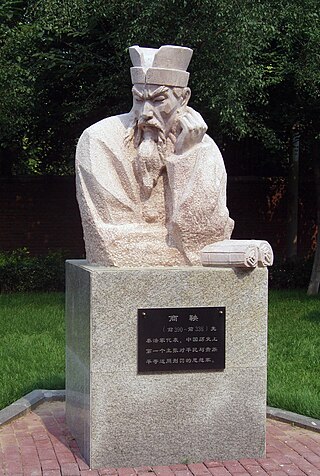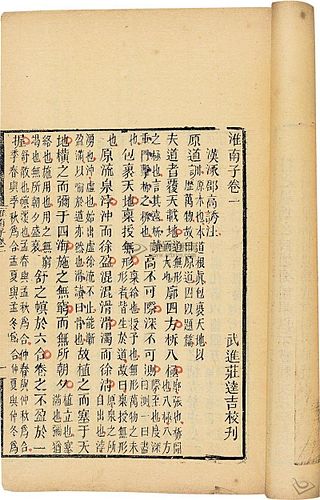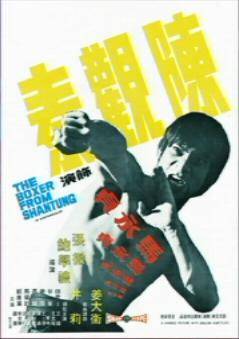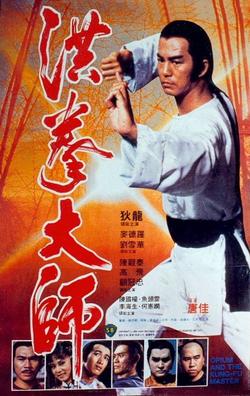Related Research Articles

The Tao Te Ching is a Chinese classic text and foundational work of Taoism written around 400 BC and traditionally credited to the sage Laozi, though the text's authorship, date of composition and date of compilation are debated. The oldest excavated portion dates back to the late 4th century BC, but modern scholarship dates other parts of the text as having been written—or at least compiled—later than the earliest portions of the Zhuangzi.
Year 1130 (MCXXX) was a common year starting on Wednesday of the Julian calendar.

Laozi, also romanized as Lao Tzu and various other ways, was a semi-legendary ancient Chinese philosopher, author of the Tao Te Ching, the foundational text of Taoism along with the Zhuangzi. Laozi is a Chinese honorific, typically translated as "the Old Master". Modern scholarship generally regards his biographical details as invented, and his opus a collaboration. Traditional accounts say he was born as Li Er in the state of Chu in the 6th century BC during China's Spring and Autumn period, served as the royal archivist for the Zhou court at Wangcheng, met and impressed Confucius on one occasion, and composed the Tao Te Ching in a single session before retiring into the western wilderness.

Zhuang Zhou, commonly known as Zhuangzi, was an influential Chinese philosopher who lived around the 4th century BCE during the Warring States period, a period of great development in Chinese philosophy, the Hundred Schools of Thought. He is credited with writing—in part or in whole—a work known by his name, the Zhuangzi, which is one of the foundational texts of Taoism.

Fajia, often translated as Legalism, is one of Sima Qian's six classical schools of thought in Chinese philosophy. Compared in the West with political realism and even the model-building of Max Weber, the "fa school of thought" represents several branches of what Feng Youlan called "men of methods", who contributed greatly to the construction of the bureaucratic Chinese empire. Although lacking a recognized founder, the earliest persona of the Fajia is often considered Guan Zhong, while Chinese historians commonly regard Li Kui as the first Legalist philosopher. The term Fajia was identified by Sinologist Herrlee G. Creel as referring to a combination of Shen Buhai and Shang Yang as its founding branches.
Emperor Min of Jin, personal name Sima Ye, courtesy name Yanqi (彥旗), was an emperor of the Jin Dynasty (266–420) and the last of the Western Jin.

The Han Feizi is an ancient Chinese text attributed to the Legalist political philosopher Han Fei. It comprises a selection of essays in the Legalist tradition, elucidating theories of state power, and synthesizing the methodologies of his predecessors. Its 55 chapters, most of which date to the Warring States period mid-3rd century BCE, are the only such text to survive fully intact. The Han Feizi is believed to contain the first commentaries on the Dao De Jing. Temporarily coming to overt power as an ideology with the ascension of the Qin dynasty, the First Emperor of Qin and succeeding emperors often followed the template set by Han Fei.
The Three Treasures or Three Jewels are basic virtues in Taoism. Although the Tao Te Ching originally used sanbao to mean "compassion", "frugality", and "humility", the term was later used to translate the Three Jewels in Chinese Buddhism, and to mean the Three Treasures in Traditional Chinese Medicine.

Wang Bi, courtesy name Fusi, was a Chinese philosopher and politician. During his brief career he produced commentaries on the Tao Te Ching and I Ching which were highly influential in Chinese philosophy.
Wing-tsit Chan was a Chinese scholar and professor best known for his studies of Chinese philosophy and his translations of Chinese philosophical texts. Chan was born in China in 1901 and went to the United States in 1924, earning a Ph.D. from Harvard University in 1929. Chan taught at Dartmouth College and Chatham University for most of his academic career. Chan's 1963 book A Source Book in Chinese Philosophy was highly influential in the English-speaking world, and was often used as a source for quotations from Chinese philosophical classics.

The Huainanzi is an ancient Chinese text that consists of a collection of essays that resulted from a series of scholarly debates held at the court of Liu An, Prince of Huainan, sometime before 139 BC. The Huainanzi blends Daoist, Confucianist, and Legalist concepts, including theories such as yin and yang and Wu Xing theories.
Hong Zicheng was a Chinese philosopher who lived during the end of the Ming dynasty.

The Boxer from Shantung is a 1972 Hong Kong kung fu / gangster film directed by Chang Cheh and Pao Hsueh-li, and starring Chen Kuan-tai, Ching Li and guest stars David Chiang. Godfrey Ho was assistant director.

Ziran is a key concept in Daoism that literally means "of its own; by itself" and thus "naturally; natural; spontaneously; freely; in the course of events; of course; doubtlessly". This Chinese word is a two-character compound of zi (自) "nose; self; oneself; from; since" and ran (然) "right; correct; so; yes", which is used as a -ran suffix marking adjectives or adverbs. In Chinese culture, the nose is a common metaphor for a person's point of view.

Gods of Honour is a Hong Kong television series adapted from the 16th-century novel Fengshen Bang, a Chinese vernacular classic written by Xu Zhonglin and Lu Xixing. The series was first aired on TVB Jade in Hong Kong in 2001. It starred Benny Chan, Chin Kar-lok, Irene Wan, Michelle Ye, Dickson Lee, Yuen Wah, Kingdom Yuen and Winnie Yeung in the lead roles.
The Mouzi Lihuolun is a classic Chinese Buddhist text. It comprises a purportedly autobiographical preface by Master Mou, a late 2nd-century Confucian scholar-official who converted to Buddhism, and an imaginary dialogue of questions and answers about Buddhist practices.
Geyi originated as a 3rd-century Chinese Buddhist method for explaining lists of Sanskrit terms from the Buddhist canon with comparable lists from Chinese classics; but many 20th-century scholars of Buddhism misconstrued geyi "matching concepts" as a supposed method of translating Sanskrit technical terminology with Chinese Daoist vocabulary. This reputed geyi "matching concepts" or "matching meanings" definition is ubiquitous in modern reference works, including academic articles, textbooks on Buddhism, dictionaries, encyclopedias, and Web-based resources.
Zhu Faya or Faya was a Chinese Jin Dynasty Buddhist monk and teacher from Hejian, best known for developing the Geyi method of explaining numbered categories of Sanskrit terms from the Buddhist canon with comparable lists from the Chinese classics. The dates of Zhu Faya's life are unknown, but he was a student of the Indian monk Fotudeng or Zhu Fotudeng 竺佛圖澄, and a contemporary of the translators Dao'an 道安 (312–385) and Zhu Fatai 竺法汰 (320–387).

Opium and the Kung-Fu Master is a 1984 Hong Kong martial arts film directed by Tang Chia, who also serves as one of the film's action directors, and stars Ti Lung as the titular protagonist.
Heshang Gong is the reputed author of one of the earliest commentaries on the Tao Te Ching of Laozi to survive to modern times, which is dated to the latter part of the Han dynasty. He was reputedly a reclusive Chinese hermit from the 1st century CE.
References
- ↑ "Alan Chan". Falling Walls.
- ↑ Chai, David (1 March 2012). "Philosophy and Religion in Early Medieval China. Edited by Alan K. L. Chan and Yuet-Keung Lo. (Albany: State University of New York Press, 2010. v, 375 Pp. Hardback, ISBN 978-1-4384-3187-1. Paperback, ISBN 978-1-4384-3188-8.)/ Interpretation and Literature in Early Medieval China. Edited by Alan K. L. Chan and Yuet-Keung Lo. (Albany: State University of New York Press, 2010. vi, 288 Pp. Hardback, ISBN 978-1-4384-3217-5. Paperback, ISBN 978-1-4384-3218-2.)". Journal of Chinese Philosophy. 39 (2): 314–316. doi:10.1163/15406253-03902012. ISSN 1540-6253.
- ↑ Cheng, Anne (1993). "Alan K.L. Chan, Two Visions of the Way. A Study of the Wang Pi and Ho-shang Kung Commentaries on the Lao-Tzu. (SUNY Series in Chinese Philosophy and Culture)". Études chinoises. 漢學研究. 12 (1): 209–210.